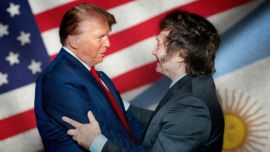Argentina has reached the outline of an agreement with Brazil to finance imports coming from its giant Mercosur partner, although some details still remain to be defined.
At a four-hour meeting in Brasília last Tuesday, President Alberto Fernández and his host Luiz Inácio Lula da Silva analysed alternatives for bringing financial assistance to Argentina, which is in the grip of runaway inflation, turbulence on exchange markets and dwindling Central Bank reserves.
The credits will seek to finance the companies exporting from Brazil over a longer term in an attempt to relieve the monthly import bill by over US$1 billion, according to government sources. The aim is to reduce the demand for hard currency which is draining Argentina’s Central Bank reserves, for which the Fernández administration will have to apply guarantees which have yet to be defined.
According to information made available to the Noticias Argentinas news agency, a credit scheme in Brazilian reales has been agreed with the Sistema de Importaciones de la República Argentina (SIRA) import authorisation body, offering a system of guarantees with future flows of incremental exports from Argentina to finance this year’s imports.
Next week there will be a new meeting between the economic teams with a summons to Brazilian exporters and Argentine importers to advance the agreement further, probably at the headquarters of the FIESP São Paulo industrial confederation.
The core of the bilateral agenda was to resume the credit lines of Brazil’s BNDES development bank to finance Argentine imports of Brazilian products, while the government also wants funding from the institution to pay for some of the infrastructure works related for the Vaca Muerta gas pipeline.
Other issues such as science, energy, defence and security were also touched upon, but the urgency related to trade and finding mechanisms to improve its depth and flow.
‘Do everything’
Lula said Tuesday he is "willing" to help Argentina and find a way to implement a credit line to support exports to Brazil’s neighbour.
"I will do everything and make any sacrifice so that we can help Argentina in this difficult moment," Lula da Silva said at a press conference at the Alvorada Palace.
Following the meeting, Lula said he is "disposed" to converse with businessmen and the Brazilian Congress to find "a solution" to the Central Bank’s lack of dollars.
Fernández arrived in the Brazilian capital seeking to negotiate assistance and incentives for Brazilian exports to Argentina, permitting his nation to continue importing despite the shortage of hard currency.
Noticias Argentinas reported the scheme agreed at the meeting is similar to the government’s yuan currency swap with China, approximating positions towards establishing a credit system with SIRA in reales.
Following the meeting the Brazilian president made it clear that the discussion over the "guarantees" to implement the credits has yet to be settled.
"We will do everything within our reach to try and resolve the existing economic and legislative problems," promised Lula, who also said he had held conversations with the members of the BRICS (Brazil, Russia, India, China and South Africa) group to help Argentina.
For his part, President Fernández celebrated "the explicit support" of Lula.
"They have taken the decision to help Brazilian companies to continue exporting to Argentina, asking us to do our duty which we have done and which has to do with the necessary guarantees so that Brazil can favour those credits,” he said. “We are putting solutions into action. Lula’s commitment is very important. Now we have to find the points of agreement and get the job done."
He concluded: "We’ve agreed on the teams of [Brazilian Finance Minister Fernando] Haddad and [Economy Minister Sergio] Massa meeting next week so that we can sort out those things."
Haddad told reporters earlier on Tuesday that some 200 Brazilian companies "are not only not exporting, but are not receiving" the corresponding payments for agreed sales, citing difficulties in Argentina.
Official sources indicated to Noticias Argentinas that the objective was to generate "the financial engineering to make trade more dynamic," using reales instead of greenbacks to "decompress the use of dollars."
Lula said that Fernández could return to Argentina “calmer… without cash but with plenty of political will."
"When we talk about finding a way out for Argentina, we’re talking about South America, we’re talking about Mercosur and we’re talking about Brazil’s main trade partner,” said the veteran leftist.
As confirmed from Brazil, credits will be sought for over 200 Brazilian companies so that they can export to Argentina, which will thus not have to resort to dollars with the pesos being directly converted into reales, financed by the Brazilian government. There will be a mechanism of compensation between reales and pesos so as not to use the dollar with the periods over which compensation is to be paid remaining to be defined.
IMF slam
Raising eyebrows with his choice of language, Lula went on to say he would lobby the International Monetary Fund (IMF) on Argentina’s behalf.
"I seek to converse via my finance minister with the IMF to remove the knife from Argentina’s throat. The IMF knows how heavily indebted Argentina is and to whom they were lending the money so that they cannot continue pressing a country which only wants to grow, create jobs and improve the lives of its people,” declared the Brazilian leader.
Fernández, in turn, praised Lula and his government for their support: “I value the efforts of Brazil to help us. I also celebrate his explicit stance on behalf of Argentina with the IMF. As they know, we are rediscussing the programme to which we committed ourselves with the IMF at the time because the conditions have objectively changed with the war [in Ukraine] and the drought."
According to reports, the president held a one-on-one meeting with Lula in the Alvorada Palace ahead of a meeting with six people from each country participating. Representing Argentina were Cabinet Chief Agustín Rossi, Foreign Minister Santiago Cafiero, Economy Minister Sergio Massa, Presidential Chief-of-Staff Julio Vitobello, Argentina’s Ambassador to Brazil Daniel Scioli and Presidential Spokesperson Gabriela Cerruti.
After the group meeting the Brazilian president hosted a dinner to round out the day, attended by some of the Argentine delegation, including first lady Fabiola Yáñez.
The meeting between Lula and Fernández followed a 45-minute video-conference call between the two heads of state on April 27. In a communiqué issued after the meeting, the leaders "highlighted the importance of deepening fraternal ties and bilateral trade" among other issues.
– TIMES/AFP/NA/PERFIL





















Comments